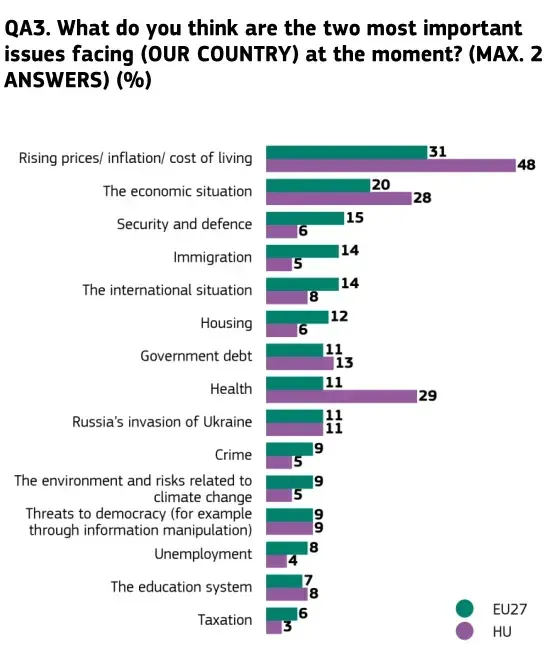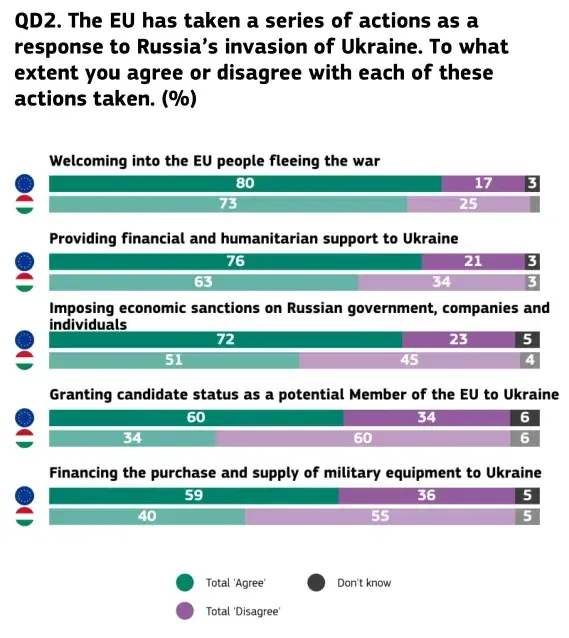The European Commission released the results of the spring 2025 edition of its Eurobarometer poll on Wednesday.
According to the results of the representative, biannual public opinion poll, in Hungary, two percent less people view the EU negatively (15 percent) than last fall, while two percent more view it neutrally. Thus, the latter (48 percent) increased their relative advantage over those with a positive view (37 percent).
The EU average has a more positive view of the EU, although Hungarian respondents feel a stronger attachment to it (69 percent). Hungarians are more pessimistic about the future of the Union than the average EU citizen, but the majority are still optimistic (56-42 percent).
Hungarian confidence in the EU has slightly declined and is now just below the EU average (48 percent), with a slim majority over those who do not share this confidence. This is still a better ratio than Hungarians’ confidence in parliament (39-58 percent) or the government (39-57 percent), but this ratio was reached at a time when confidence across the EU reached an 18-year high.
Hungarians mentioned the important challenges facing the EU in roughly the same proportions as the EU average, with the war in Ukraine coming first, followed by migration (which slipped to fourth place in the EU), while security and defense, which ranked third in the EU, was only half as important to Hungarian respondents.
However, there are significant differences when it comes to challenges in the individual member states. Although high prices and the cost of living are among the top concerns across the EU, they are only mentioned by 31 percent of respondents, far below the Hungarian figure of 48 percent. This is the second highest percentage after Croatia. Healthcare came in second place in this category, almost three times higher in Hungary (at 29 percent) than the average, and the economic situation was also of much greater concern to Hungarian respondents than to those in the EU, while immigration and housing were much less so.

Not surprisingly, there are also big differences when it comes to helping Ukraine. In terms of accepting refugees, financial and humanitarian aid, and sanctions for Russia, the difference compared to the EU gets bigger in the order of these topics, but there's still a majority in favor of all of these. On the other two questions having to do with Ukraine, those who reject these ideas are in the majority, and
Hungarians would actually be more willing to sell weapons to Ukraine (40 percent agree, 55 percent disagree) than to grant the country EU membership (34-60 percent).
The Hungarian results are roughly the opposite of the EU average for both questions. Compared to half a year ago, opposition to Ukraine joining the EU rose by six percent, while support fell by five percent, which is easily explained by the impact of the government's currently ongoing campaign accompanying the national opinion poll on the matter.

However, there were areas where the opinions of Hungarian respondents differed significantly from those of the government. A higher proportion (50 percent) of respondents than the EU average believed that if “other countries” increased their trade tariffs, the EU should take similar measures to protect its interests. The proportion of those who completely agreed (32 percent) with this was lower, but the two together still exceeded the EU average and constituted a convincing majority compared to those who disagreed with this response. The Hungarian government was the only one to reject the counter tariffs approved in response to the US's recent measure.
Hungarian respondents rated their country's economic situation slightly better than average in the EU, by two percentage points, but their assessment of the situation of their household and their job was worse (by ten percent) compared to the EU average. In the case of the first question, the majority (58-40 percent) considered the situation to be bad, while twice as many said they considered it to be good rather than bad in the case of the other two questions.
For more quick, accurate and impartial news from and about Hungary, subscribe to the Telex English newsletter!